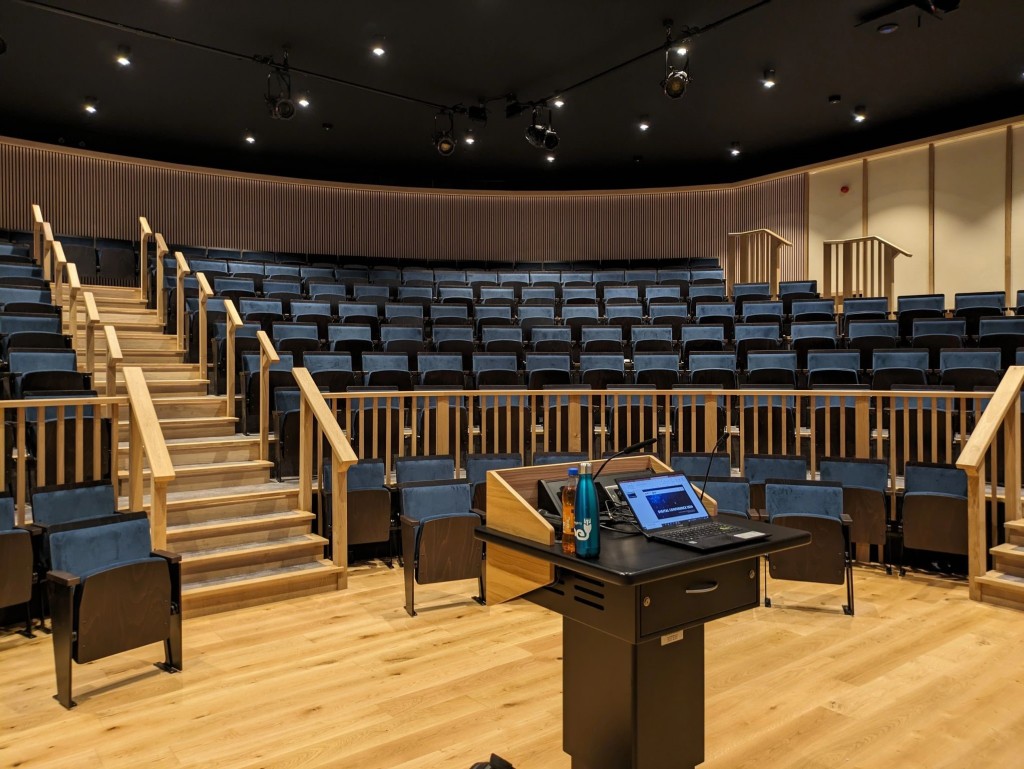
I once again was privileged to speak at the ISC digital conference the other week, this time as the vice chair for the ISC digital advisory group as opposed to a member. It was, as it was last year, a very useful and interesting conference, combined with an iconic location in Bletchley park. I scribbled many notes from the various sessions and therefore wanted to distil those into a couple of key thoughts below.
Prof Miles Berry was his usual barrel of energy in his presentation, putting forward lots of interesting points for consideration. Following on for the Oxford Academies Business Managers Group (OABMG) conference I attended the other week, Miles certainly was brave in his presentation, opting to actually do a live demonstration to illustrate the potential power of generative AI in terms of helping towards the challenges related to teacher workload. I have attended so many conferences which discuss AI but it was so nice to actually see it in practice as Miles took a topic from the audience and worked through the creation of content for students, resources, lesson plans, etc., all in the space of minutes, but also highlighting that a teacher at their best could likely do better, but certainly not quicker. This clearly highlights the efficiency and workload benefits of generative AI, but also the importance of seeing genAI as an assistant to be paired with our own human strengths.
Neelam Parmar then presented on developing an AI curriculum and there was one question which stuck very much with me. What is AI? Now why this stuck with me is both the inconsistency in terms of the use of the term and related terms (machine learning, deep learning etc.) but also in terms of the broader question it might hint to in terms of what is intelligence. Can we accurately and consistently define what we mean by intelligence? And if we cannot can we truly be confident in creating an intelligence, an artificially created intelligence or AI? It’s a bit deep, but maybe this is a question we maybe need to consider, as it also hints towards considering the differences between human and artificial intelligence, and therefore the benefits and drawbacks of each. I do often wonder how different an AI is to human intelligence in terms of how the human brain really works in processing the huge amount of “data” in the experiences and information we consume throughout our lives. Is the key difference between AI that of emotion and the physical nature of our intelligence in relation to our physical existence?
The AQA presentation was next up in terms of ideas which stuck with me, helping me feel a bit more positive in terms of where we are in terms of exam board engagement in relation to the use of AI in assessment and in schools. I will admit to being disappointed that the Polish and Italian trial has been pushed back further to 2027, which I think is too far away, however, I get that it takes everyone to be onboard to move this forward so there are hoops exam boards must go through. That said there were definitely positive noises in relation to analytical data on outcomes with school data being pulled in, and resulting info pushed back. This goes to reducing the administrative burden but also to more effective use of the vast amounts of data schools gather. It was also good to hear of AQA seeking to share a diagnostic tool for Maths; Tools like this might just help us to find the best way forward in relation to adaptive, diagnostic and even summative testing.
I once again enjoyed hearing Tom Dore talk about esports and the potential benefits for schools adopting this. It aligned so well with the earlier presentation which highlighted some of the softer skills which the World Economic Forum have identified as important for the future. It is so much more than simply gaming, but involves communication, leadership, resilience, problem-solving and so much more, plus it often engages students who may be otherwise less engaged. It was also so good to hear Amy-Louise Cartwright’s approach in her school and how they, albeit in their early stages of development, have already made progress and have plans for the future. I loved the esports suite they have created, as although we have been involved here in esports for a while we have been using our normal IT labs, albeit with upgraded PCs capable of supporting the relevant esports games.
Conclusion
The ISC digital conference, like so many other conferences, is about getting schools and school staff together and sharing. This year’s conference did exactly that, and that let me get my piece in as well which was nice. It was also nice to be at Bletchley Park and its wonderful auditorium. Now I will note my train ride to and from the venue was far from straightforward, but the trek was worth it, and I look forward to seeing where we stand in a years time, at the 2025 conference. Will we have progressed significantly, be asking the same questions, or will the challenges have changed or even been addressed? Only time will tell.

